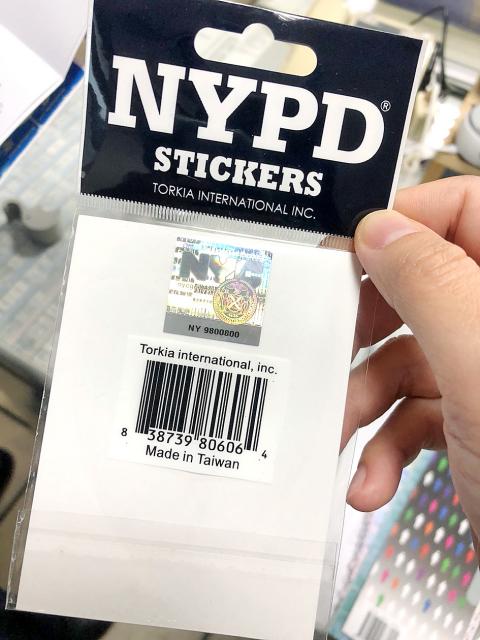President Tsai Ing-wen (蔡英文) yesterday spoke out against a proposal by Kaohsiung Mayor Han Kuo-yu (韓國瑜) to establish a free economic zone in the city, saying it could cause Chinese goods to be mistaken for Taiwanese goods.
If a free economic zone made it unclear whether US-bound goods were Taiwanese or Chinese, the effect on Taiwan from the US-China trade dispute would be greater than elsewhere, so the government is opposed to a free economic zone, Tsai said.
The US-China trade dispute could affect the entire global economy if not reined in, she said.

Photo: Wang Chieh, Taipei Times
Trump on Sunday said that he was considering increasing tariffs on US$200 billion of Chinese goods in response to slow negotiations.
The government was constantly preparing response measures to changes in the global economy, Tsai said.
The most crucial task would be to encourage Taiwanese businesses to bring production back to the nation so that it could export more Taiwanese goods, not Chinese goods, she said.
This would be the best way to avoid high tariffs imposed on China by the US, she said.
Bringing Chinese goods into Taiwan through a free economic zone would tie Taiwan to China’s economy and turn Chinese goods into Taiwanese goods, she said.
“Just as the US-China trade dispute is heating up, there are actually politicians who want to import Chinese tea and process it here so that it becomes ‘Taiwanese tea,’” Tsai said.
Doing so would harm the good reputation that Taiwanese products have and invite retaliation from the US, she said.
Taiwanese would not accept such a scenario, she said.
Taiwan has expanded production and demand for local products domestically and globally, she said, adding that to set up a free economic zone would be a step backward.
Separately yesterday, Han said he was happy to see the issue of free economic zones being discussed.
If the Executive Yuan is planning to promote the idea, he hopes they would “prioritize Kaohsiung and give the city a chance,” Han said at a Kaohsiung City Government question-and-answer session.
His hope was to increase competitiveness by lowering tariffs, and easing restrictions would help accomplish this, he said.
Concerns about Chinese goods being confused for Taiwanese goods were just “one angle,” Han said, adding that the government should test the idea in Kaohsiung.
Although his comments regarding free economic zones might differ from the ideas of economists, hopefully the Executive Yuan would “give Kaohsiung a chance,” he said, adding that he hopes the city would “turn over a new leaf” economically by implementing the idea.

Taiwanese actress Barbie Hsu (徐熙媛) has died of pneumonia at the age of 48 while on a trip to Japan, where she contracted influenza during the Lunar New Year holiday, her sister confirmed today through an agent. "Our whole family came to Japan for a trip, and my dearest and most kindhearted sister Barbie Hsu died of influenza-induced pneumonia and unfortunately left us," Hsu's sister and talk show hostess Dee Hsu (徐熙娣) said. "I was grateful to be her sister in this life and that we got to care for and spend time with each other. I will always be grateful to

UNITED: The premier said Trump’s tariff comments provided a great opportunity for the private and public sectors to come together to maintain the nation’s chip advantage The government is considering ways to assist the nation’s semiconductor industry or hosting collaborative projects with the private sector after US President Donald Trump threatened to impose a 100 percent tariff on chips exported to the US, Premier Cho Jung-tai (卓榮泰) said yesterday. Trump on Monday told Republican members of the US Congress about plans to impose sweeping tariffs on semiconductors, steel, aluminum, copper and pharmaceuticals “in the very near future.” “It’s time for the United States to return to the system that made us richer and more powerful than ever before,” Trump said at the Republican Issues Conference in Miami, Florida. “They

TAIWAN DEFENSE: The initiative would involve integrating various systems in a fast-paced manner through the use of common software to obstruct a Chinese invasion The first tranche of the US Navy’s “Replicator” initiative aimed at obstructing a Chinese invasion of Taiwan would be ready by August, a US Naval Institute (USNI) News report on Tuesday said. The initiative is part of a larger defense strategy for Taiwan, and would involve launching thousands of uncrewed submarines, surface vessels and aerial vehicles around Taiwan to buy the nation and its partners time to assemble a response. The plan was first made public by the Washington Post in June last year, when it cited comments by US Indo-Pacific Commander Admiral Samuel Paparo on the sidelines of the Shangri-La Dialogue

REMINDER: Of the 6.78 million doses of flu vaccine Taiwan purchased for this flu season, about 200,000 are still available, an official said, following Big S’ death As news broke of the death of Taiwanese actress and singer Barbie Hsu (徐熙媛), also known as Big S (大S), from severe flu complications, the Centers for Disease Control (CDC) and doctors yesterday urged people at high risk to get vaccinated and be alert to signs of severe illness. Hsu’s family yesterday confirmed that the actress died on a family holiday in Japan due to pneumonia during the Lunar New Year holiday. CDC Deputy Director-General Tseng Shu-hui (曾淑慧) told an impromptu news conference that hospital visits for flu-like illnesses from Jan. 19 to Jan. 25 reached 162,352 — the highest